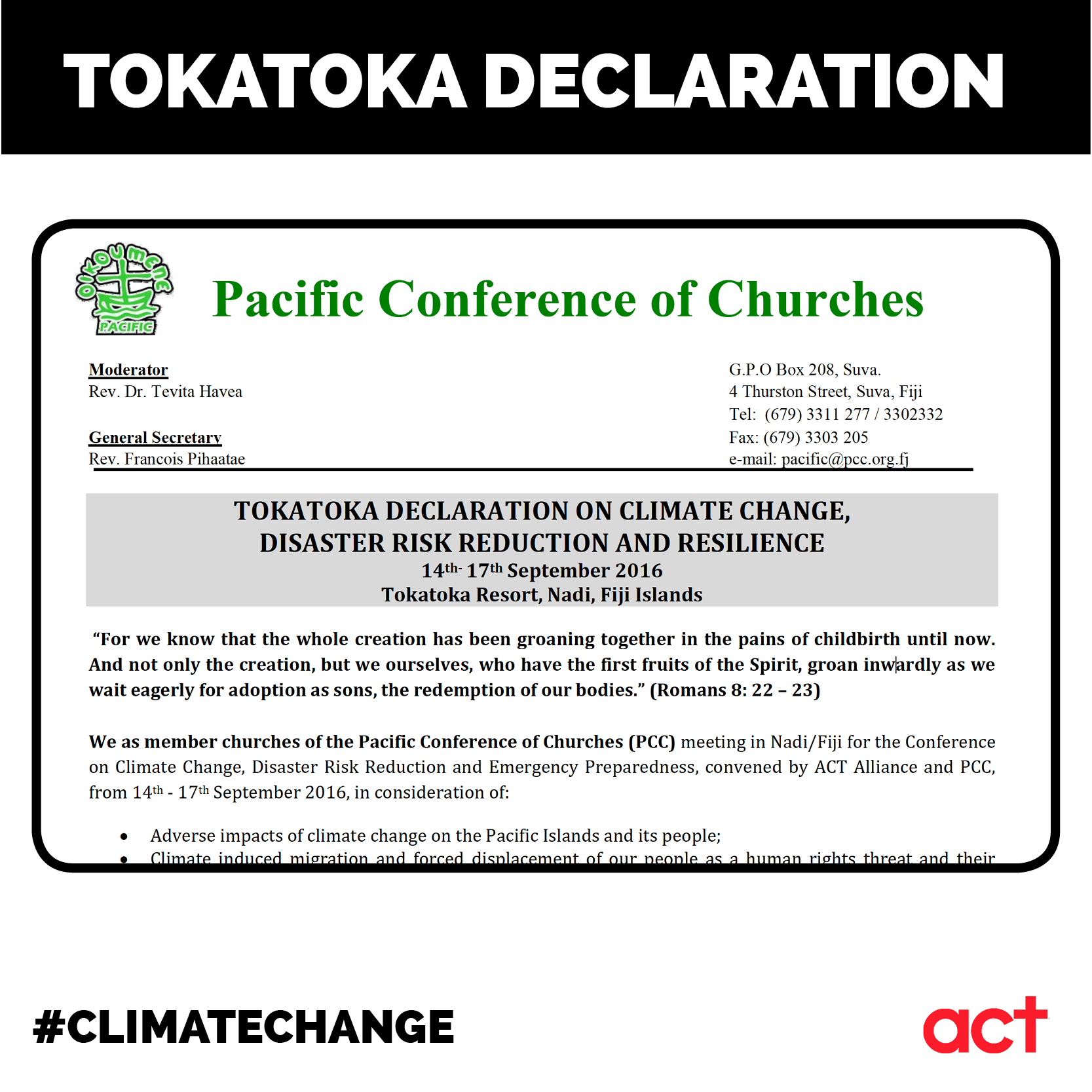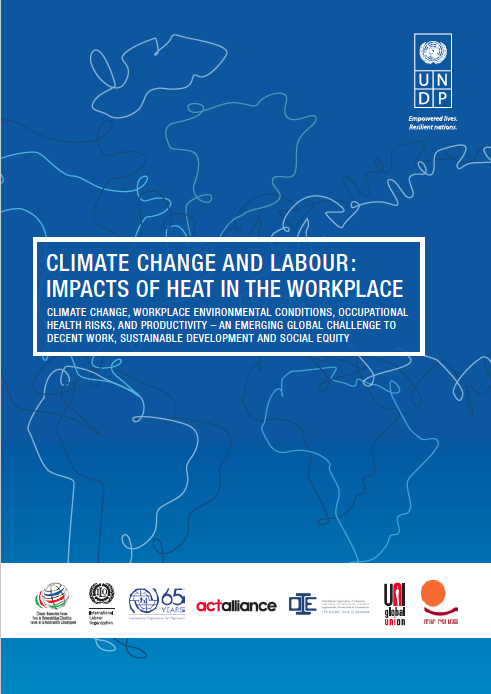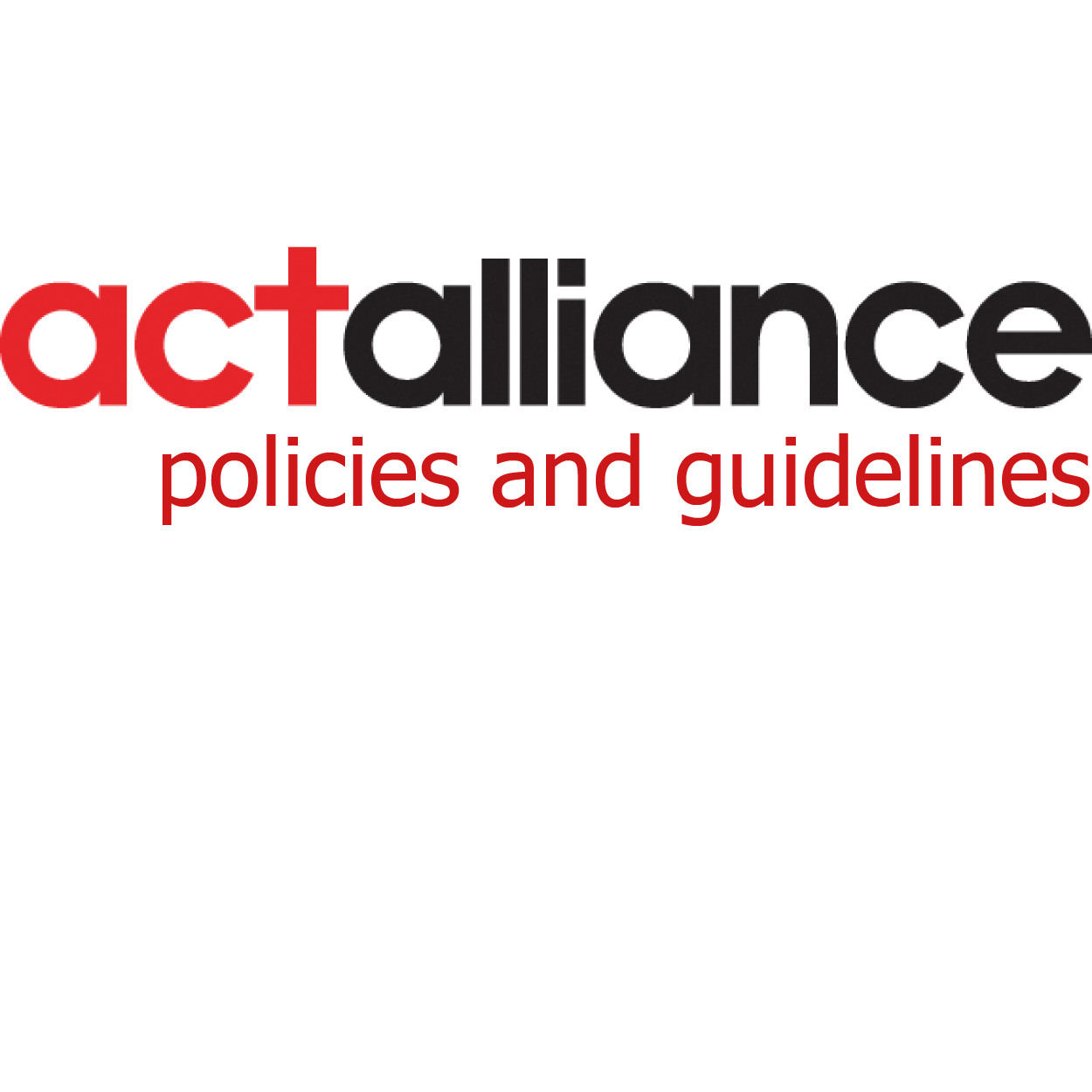Tokatoka declaration on Climate Change, Disaster Risk Reduction and Resilience
A Workshop on Climate Change Disaster Risk reduction & Adaptation in the Pacific Region was held in Nadi, Fiji, from 14 to 17 September. Co-hosted by the Pacific Conference of Churches (PCC) and ACT Alliance, the workshop was supported by ACT members Brot für die Welt and Church of Sweden.
Representatives from PCC secretariat; member churches from French Polynesia, Fiji, Kiribati, Papua New Guinea, Samoa, Solomon Islands, Tonga, Tuvalu and Vanuatu; ACT secretariat and regional office, the Pacific, Australia and New Zealand Forum (PANZ) and Germany, and international experts have attended the workshop
According to the ACT Regional Representative, Asia and the Pacific, Anoop Sukumaran, “the workshop succeeded in bringing together member churches, institutions and organisations of ACT Alliance and the Pacific Conference of Churches (PCC) to discuss and build up capacity on climate change associated disaster risks, and challenges and approaches to foster climate resilience and climate protection in terms of both, policies and programs at local, regional and international levels”.
Furthermore, the workshop enabled exchanging lessons learned, identifying synergies and entering into a dialogue on possible future co-operations between ACT and PCC members to better protect the most vulnerable due to climate change.
The Tokatoka Declaration n Climate Change Disaster Risk reduction & Adaptation has been developed at the end of the workshop.
Read the document here: tokatoka-declaration-final
Tokatoka declaration on Climate Change, Disaster Risk Reduction and Resilience

A Workshop on Climate Change Disaster Risk reduction & Adaptation in the Pacific Region was held in Nadi, Fiji, from 14 to 17 September. Co-hosted by the Pacific Conference of Churches (PCC) and ACT Alliance, the workshop was supported by ACT members Brot für die Welt and Church of Sweden.
Representatives from PCC secretariat; member churches from French Polynesia, Fiji, Kiribati, Papua New Guinea, Samoa, Solomon Islands, Tonga, Tuvalu and Vanuatu; ACT secretariat and regional office, the Pacific, Australia and New Zealand Forum (PANZ) and Germany, and international experts have attended the workshop
According to the ACT Regional Representative, Asia and the Pacific, Anoop Sukumaran, “the workshop succeeded in bringing together member churches, institutions and organisations of ACT Alliance and the Pacific Conference of Churches (PCC) to discuss and build up capacity on climate change associated disaster risks, and challenges and approaches to foster climate resilience and climate protection in terms of both, policies and programs at local, regional and international levels”.
Furthermore, the workshop enabled exchanging lessons learned, identifying synergies and entering into a dialogue on possible future co-operations between ACT and PCC members to better protect the most vulnerable due to climate change.
The Tokatoka Declaration n Climate Change Disaster Risk reduction & Adaptation has been developed at the end of the workshop.
Read the document here: tokatoka-declaration-final
Climate and Labour: Impacts of heat in the workplace

April 2016 – A publication highlighting climate change, workplace environmental conditions, occupational health risks, and productivity – an emerging global challenge to decent work, sustainable development and social equity.
Developed in collaboration with the ILO, the International Organization for Migration, UNI Global Union, the International Trade Union Confederation, the International Organization of Employers, and ACT Alliance, and together with the Climate Vulnerable Forum and the support of the the World Health Organisation, this report looks at the impact of rising temperatures due to climate change on the workforce.
Read the document HERE
No one left behind – stories and lessons for disability inclusion in development and humanitarian 2015

This document has been developed by the ACT Alliance Community of Practice on Disability Inclusive Development.
In line with ACT Global Strategy which is envisioned to FULL LIFE AND DIGNITY FOR ALL, the Community of Practice in Disability Inclusive Development embraces the approved global framework in development (SDGs) and disaster risk reduction (SFDRR) and has jointly collected the stories and lessons from its work to show practical ways in which disability inclusion is, and can be, implemented in humanitarian and development work.
It is also an attempt to share evidence that a disability inclusive approach actually help us, respectively and as ecumenical alliance, to achieve our dream that no one should be left behind in this promised world.
No one left Behind 2015
ACT Alliance global strategy 2015-2018

We believe that the world must be transformed for the better. What looks impossible can become possible if we all seek transformation. This includes those with power, wealth and influence, as well as those most affected by injustice. Transformation is about change in ourselves and in our relationships with one another. Right relations are needed in all levels – locally, nationally and globally.
We need to actively seek these social, economic and political changes, but can only do so with the help of God. With this second global strategy for ACT Alliance, we commit to doing our part in this transformation to attain full life and dignity for all. This will require every part of the alliance – all members and all alliance structures – to find their place and do their utmost to make this strategy successful. As such, all parts of the alliance will be asked to develop work plans that operationalise this strategy in their particular context.
ACT_global_strategy 2015-2018 ENGLISH
ACT_global_strategy_2015-2018_FRENCH
ACT_global_strategy_2015-2018_SPANISH
Clapping with both hands: promoting gender equality

The Syrian crisis and its impact on Lebanon – A conflict analysis

Almost 4 million people have fled Syria since the outbreak of the civil war, 1.2 million of whom are refugees in Lebanon -that is, about one in five people living in Lebanon is a refugee from the Syrian war. The present report analyses the impact of the Syrian conflict and refugee crisis on Lebanon and Lebanese host communities.
This brief analysis presents the main conflict issues and trends, and the network of interaction between local and national level conflict dynamics. It provides an overview of key actors relevant to addressing intercommunal conflict and draws some programming implications, for both conflict sensitivity of current programming and further opportunities for conflict transformation.
Since the beginning of the conflict in Syria, almost 1.2 million Syrians have sought refuge in Lebanon1. Norwegian Church Aid (NCA) with its partner International Orthodox Christian Charities (IOCC) has been providing assistance to Syrian refugees in Lebanon and host communities since January 2014. This includes good in kind to refugees as well as the rehabilitation of water and sanitation infrastructure in schools and clinics, and hygiene promotion program in schools. Geographically, programmes are implemented in the North (Bebnine, Akkar, Tripoli, Khoura, Dinnieh), South (Zahle Caze, Bint Jbeil, Nabatiyyeh) and in the Bekaa Valley (Bar Elias, West Bekaa Caza).
In the light of the size of influx of refugees from Syria to Lebanon, the very difficult humanitarian context inside Syria and the volume of humanitarian assistance provided, NCA found it important to conduct a conflict analysis of the Syrian refugee crisis, the humanitarian interventions and the related transfer of resources, and its impact on the Lebanon and the Lebanese host communities – especially those being targeted by NCA programmes.
Along with being a conflict-sensitive programming tool, to ensure that programmes ‘Do No Harm’, this Norwegian Church Aid (NCA) conflict analysis also aims at serving as a necessary entry point for working on the conflict, facilitating suitable forms of peacebuilding interventions.
NCA 2015 Lebanon Conflict Analysis
Churches and Faith Communities in the face of Oppression and Violence against Indigenous and Mestiza Women in Guatemala






